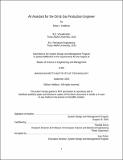AI assistant for the oil & gas production engineer
Author(s)
Heilbrun, Brian J. (Brian James)
Download1262991228-MIT.pdf (6.372Mb)
Alternative title
Artificial intelligence assistant for the oil and gas production engineer
Other Contributors
Massachusetts Institute of Technology. Engineering and Management Program.
System Design and Management Program.
Advisor
Randall Davis.
Terms of use
Metadata
Show full item recordAbstract
In the Oil & Gas industry Production Engineers are responsible for monitoring well performance and ensuring that each well produces at its target rate. Wells can experience a wide variety of problems that negatively impact production. It is the Production Engineer's responsibility to identify and fix these problems as early as possible. Well tests that measure how much oil, gas, and water a well is producing are taken for each well once a month. Production Engineers are able to identify when a well has a problem by observing trends in well test data. When a well's production declines faster than expected, the Engineer will conduct a study of all the activity in the area in hopes of identifying what events caused the change in behavior. The sheer volume of wells for which an Engineer is responsible, coupled with the amount of time it takes to investigate each problem, poses a major challenge. We have developed a program capable of monitoring well performance that can identify and describe changes in well performance. When a change is detected, the program investigates data from nearby wells and provides a summary of the events it deems most likely to be responsible for causing the change. The program can make suggestions based on these findings and provide daily reports that allow Engineers to focus on executing the solution rather than investigating the problem. By creating a framework that allows the program to make sense of event-behavior pairs, we have created an assistant that supports Production Engineers in their most critical role. Furthermore, we have tested the systems that will allow this program to act as a true assistant to the Engineer, and not simply function as another tool that must be learned. In addition to performance monitoring and root cause identification already described, these systems include speech-based interaction, data querying, and results visualization.
Description
Thesis: S.M. in Engineering and Management, Massachusetts Institute of Technology, System Design and Management Program, September, 2020 Cataloged from the official version of thesis. "September 2020." Includes bibliographical references (page 88).
Date issued
2020Department
Massachusetts Institute of Technology. Engineering and Management ProgramPublisher
Massachusetts Institute of Technology
Keywords
Engineering and Management Program., System Design and Management Program.